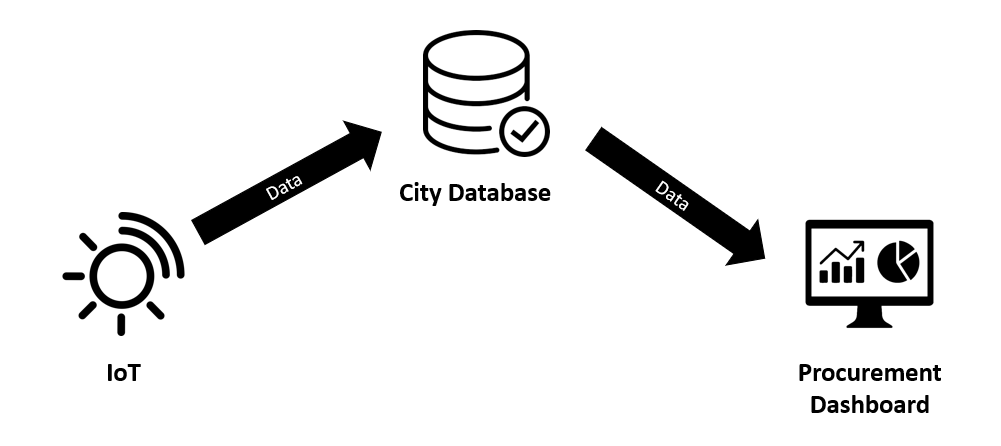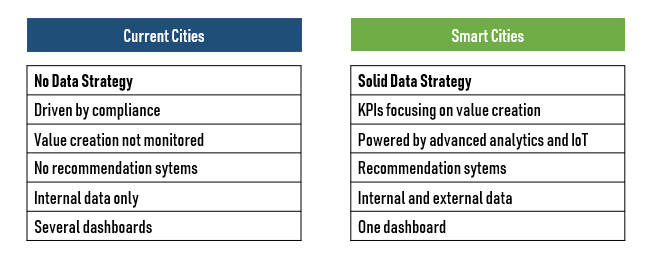By 2050, the urban population will grow to over 70% with more than 4.8 billion people living in cities. Aging infrastructure and massive population growth are huge concerns for cities.
In this context, it is crucial to upgrade existing tools and truly embrace the “smart city” idea. A new Procurement policy can make a profound impact on a nation or industry.
Procurement is a major concern/challenge for all cities that have to handle limited resources, resistance to innovations and little room for failure, hence, choosing the right Procurement strategy is no easy task. Over the years, we have noticed that standard procurement processes are restrictive. Unfortunately, public Procurement specialists take time and lack the flexibility required to change and adapt specifications to the reality of the problem they are trying to solve. In our experience, many cities end up purchasing technologies that are out-of-date or out-of-scope.
Despite this situation, more and more city procurement officials are looking for innovative ways to transform their cities. However, they can easily get lost in the midst of all these buzzwords when trying to identify the best possible technology to an existing issue.
Adapting the procurement process to today’s challenges is key. We believe that the successful advanced procurement solution requires structured workflows, a strong knowledge of what Procurement is truly about and data-driven solutions to perfectly merge with the city’s operating system.
Procurement, IoT, Advanced Analytics…
The most advanced solutions available are those that leverage the Internet of things through the use of specific sensors embedded within a given product (for instance, lighting applications). We can collect an ever-increasing number of data related to the product consumption and generate exclusive insights that can help Procurement teams keep an eye on products/services performance, contract management and monitor key performance indicators. We can also compare performance with external data that help Procurement teams to put things in perspective (for instance, local consumption compared with national levels, real-time electricity prices, etc.)
We have decided to help cities through a tool that is powered by advanced analytics that can make the best out of both internal and external data thanks to the rise of APIs and open data culture. We managed to create exclusive and valuable new Procurement KPIs for some of our clients. On top of this, data visualization techniques help Procurement specialists better understand their data.

Why is it hard for cities to change their Procurement strategy?
Public decision-makers are very cautious and quite reluctant to new solutions that could shake their existing processes and have no desire to possibly fail and learn just like any other organization. The decision process is complex due to the numerous decisions-makers involved. Moreover, we noticed that even when a city knows what they want and have an understanding of the technological landscape, public Procurement processes and rules tend to favor existing solutions and penalize new, innovative solutions. Procurement will not only need new advanced tools but also an effort to invest in training procurement professionals to meet future needs. Learning from examples of where innovative procurement has driven novel and effective solutions can kick-start a procurement sea change. We have decided to spend a lot of time on not only providing the best possible tool but also guide cities in the process of adopting such tools.
Other issues are related to the nature of cities. Indeed, new projects can be slowed down by elections or other political cycles challenges. Furthermore, most Procurement solutions require multiple departments to align and, in that case, departments or employees resist the implementation of disruptive systems.
New approach
We have chosen to build tailored-made solutions based on the exact issues, the city wants to solve. This idea of building proof of concepts out of our existing solutions enables us to perfectly understand what the city needs. Our goal is to make sure that both parties end up with a satisfactory result. Since Procurement is a very specific field with unique tasks, we help cities in identifying the best approaches that constitute the best chance for innovation. Obviously, this requires cities to consider procurement not as something to occasionally dip into, but as a key process for the development of a “smart city”.
We like to start small with solutions that can scale up fast. The idea is to help the adoption of such tools and update the product with time.
One way to illustrate this approach would be through our latest development. We have built a strategic procurement solution powered by advanced analytics that can leverage both internal & external data and data visualization techniques to better harness the potential of data. We also explored how open data and open contracting can be an effective way to engage and manage suppliers.
How to use data to solve cities’ key problems?
We have noticed that most Procurement specialists have the same issues when it comes to city management. They want to transition from processes driven by compliance and routine with limited performance goals in minds to advanced solutions that can anticipate needs and help them perform better. They fall into the trap of re-issuing contracts that have no clearly defined purpose in terms of value creation. This means that contracts fall short from the onset and quality of life for citizens cannot improve.

Through data analysis, it becomes possible to recommend new opportunities to the Procurement team. Information and data about contract implementation can also be used to improve supplier performance.
Data can also help address the inconsistency in results among service providers across the city. Indeed, automatically generated reports provide concrete metrics to discuss the suppliers’ achievements.
This adds an extra incentive for companies to continue innovating and improving the product or service throughout the length of the project. It also minimizes risk for the city because it won’t be stuck paying for a solution if it is botched. It’s a win-win for both the city and suppliers and spurs constant innovation for smart cities, which adds the further benefit that citizens will have access to the best services possible.
Data Governance
Having an updated and long-term oriented Procurement solution is mandatory if a city wants to become “smart”. However, based on our experience, data governance requires some actions too. We always guide our partners in the development of a real and solid data strategy that includes governance. Most of the time, cities are unable to make the best use of data without the right systems of governance.
Many of our clients were using different dashboards with complex analytics on top but they were not integrated and the data did not talk to each other (data silos). We helped them fix this organizational problem and align the technology with the human process.
It is all too often the case that “smart procurement” is not being adopted by procurement officers since they could be unaware of what data can do and see procurement regulations as a constraint.
“When you tell Procurement specialists about smart IoT devices or advanced analytics, they don’t see applications. They would never have known that was even something they should look at”
In our opinion, Procurement in the context of “smart cities” will need more than just advanced solutions. A significant investment in training procurement professionals to meet future needs is required. We are committed to the advance of smart cities around the world. We firmly believe that Procurement must be at the center of this new era in which public spend can be better controlled and cities become smarter through the use of data.
Written by Alexandre Gonfalonieri



